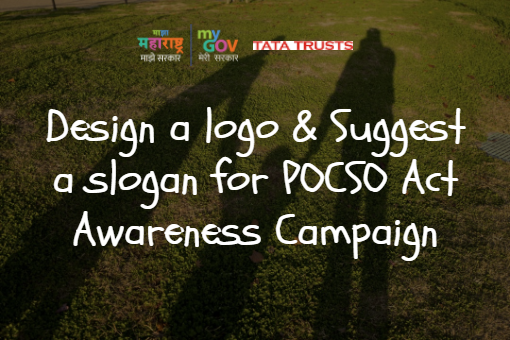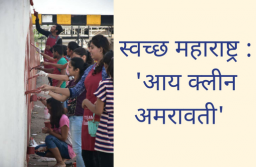Design a Logo and Suggest a Slogan for POCSO Act Awareness Campaign
1.1 Impact of Child Sexual Abuse ...

1.1 Impact of Child Sexual Abuse
Child Sexual Abuse is not only a violation of a child’s body but of the trust, implicit in a care giving relationship. Post Sexual abuse, children immediately experience conflicting emotions such as: shock, shame, rage, confusion and guilt. Often, these emotions carry on as they grow into adults. High rates of depression, anxiety, substance abuse, dissociative disorders, interpersonal dysfunction, sexual problems, and suicidal ideation have all been identified to varying degrees among women and men who survived sexual abuse and have not received adequate support in their childhood.
1.2 Prevalence and present legal support
Child sexual Abuse is a startling everyday reality for as many as half of the country’s children (National Study on Child Abuse, 2007). In order to provide legal support to children who are victims of sexual abuse, the Ministry of Women and Child Development championed the introduction of the Protection of Children from Sexual Offences (POCSO) Act, 2012 with the objective of providing protection to all children from the offences of sexual assault, sexual harassment and pornography. The Act defines a child as any person below eighteen years of age, and regards the best interests and well-being of the child as being of paramount importance at every stage, to ensure the healthy physical, emotional, intellectual and social development of the child. The act deems a sexual assault to be “aggravated” under certain circumstances, such as when the abused child is mentally ill or when the abuse is committed by a person in a position of trust or authority vis-à-vis the child, like a family member, police officer, teacher, or doctor. People who traffic children for sexual purposes are also punishable under the provisions relating to abetment in the Act. The Act prescribes stringent punishment graded as per the gravity of the offence, with a maximum term of rigorous imprisonment for life, and fine.
In India 54.5% of total incest rape victims are children below 18 years (National Crime Records Bureau (NCRB), 2015). Maharashtra reported maximum cases of crime against children which accounts for 14.8% of total such reported cases (NCRB 2015). In the year 2016, cases under the Protection of Children from Sexual Offences Act, 2012, accounted for 33.68% of all cases of crime against children in 2016. Maharashtra reported second highest cases under the Protection of Children from Sexual Offences Act, (NCRB 2016).
1.3 Need for Prevention Mechanisms
In spite of the shocking statistics and negative impact, there is lesser recognition for the issue of Child Sexual Abuse as a serious and highly prevalent social issue due to the social and cultural taboo. The victims commonly become subjects of social stigma, which prevents them from coming forward with disclosure of their own experiences. Parents do not have the knowledge or comfort to support children either by being watchful or by talking to them and hand-holding them in the case of abuse. While the criminal justice and related systems may offer deterrence, imprisonment, reintegration, these efforts are implemented only after the crime has happened and reported. However, a multifaceted problem like child sexual abuse cannot be addressed only by responding to it after it has happened. This need to be addressed from a preventive lens which encourages deterrence efforts along with intervention and treatment as it ensures the safety of an entire population. It also has the potential to diminish the number of sexual offenders in the general population and diminish sexual victimization in the community. It thus becomes imperative that interventions are taken to prevent Child Sexual Abuse and heal its ill effects in the lives of the victims and survivors.
1.4 Way forward
Given the number of cases reported in Maharashtra under POCSO, Collector Office, Chandrapur, along with Tata Trusts, has taken the initiative of enabling child protection to minimize instances of Child Sexual Abuse. The district plans to initiate awareness and capacity building programmes for adults such as parents, community members, teachers and non-teaching staff members so that they can create strong safety and support networks around children and provide appropriate support when children disclose an instance of abuse. Teachers will also be specifically trained on conducting the Personal Safety Education programme in all schools with children from Grade 1 to 10. The administration would also be working closely with the district’s judiciary, police and women and child development departments to assess and strengthen the existing legal system and make the district POCSO compliant.
The Government of Maharashtra invites you to join hands in this initiative and help us design a fitting logo and slogan to represent the campaign for sensitizing public towards POCSO Act and breaking the stigma against Child Sexual Abuse in Chandrapur district.
The last date of submission is 10th March 2018 at midnight.
The winning logo and slogan will be awarded a cash prize of ₹7500 each and will become the official logo and slogan for this initiative.
Click here to read the Terms and Conditions.
NOTE – Entries submitted through Maharashtra MyGov ONLY will be considered.







sandipghayal80@gmail.com 7 years 5 months ago
बालपण निरागस जीवन -नका करू लैंगिक शोषण.